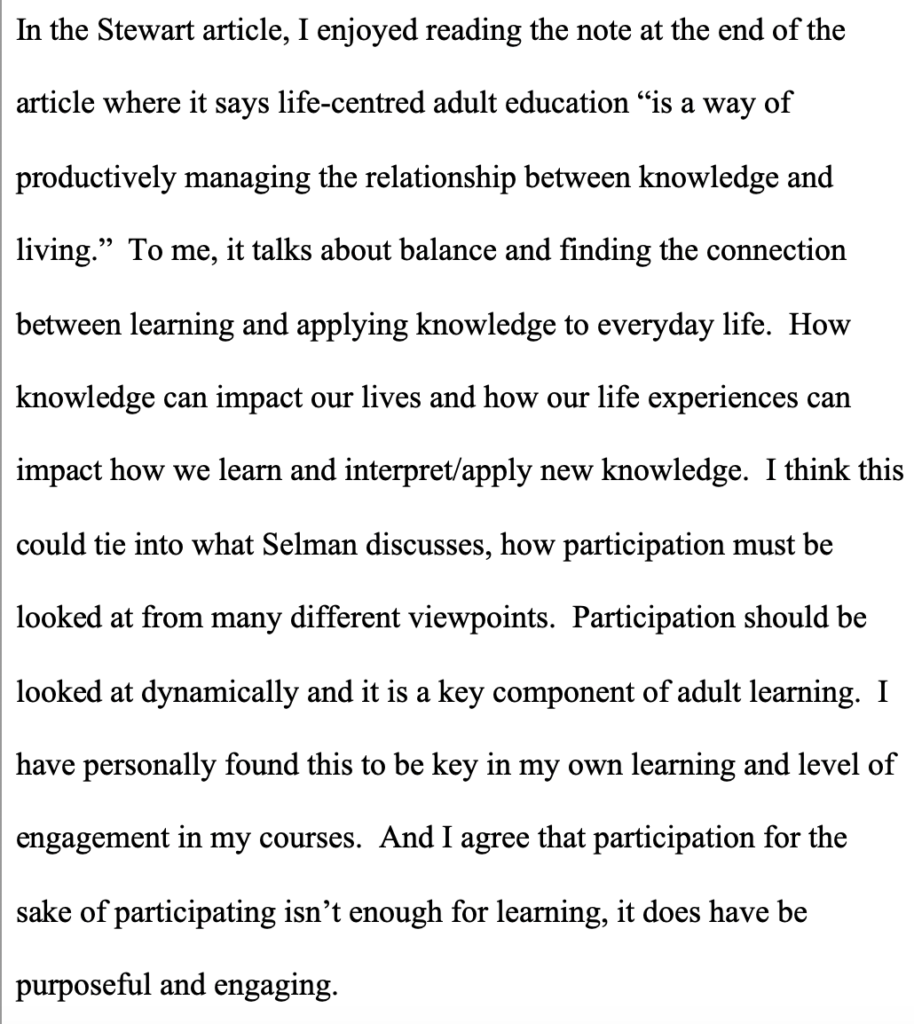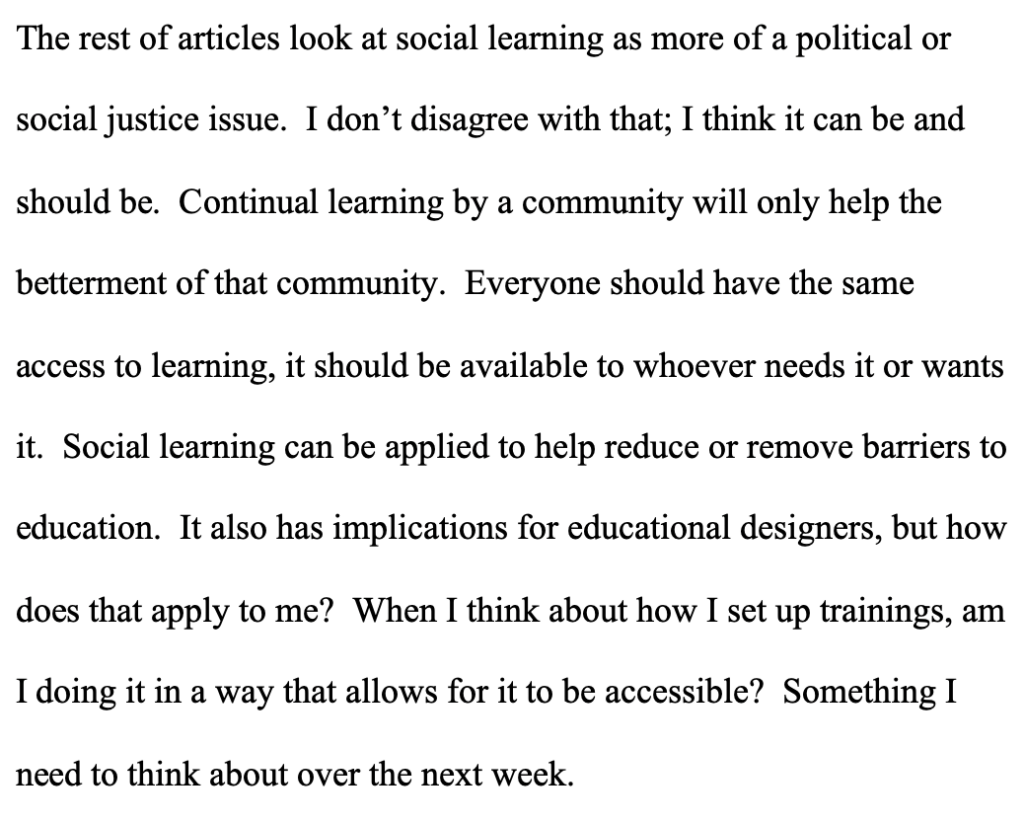Reflective Journal
My final artefact is from the last course I took prior to starting this portfolio component, MDDE 613: Adult Education and Lifelong Learning. This course was the last elective course I needed to complete the Masters program. This assignment was a two-part reflective journal that was worked on throughout the course to reflect on my learning through the course content. This first part (Assignment 1A) consisted of 10 journal entries over the first 10 weeks of the course and the final part (Assignment 1B) was a summary reflection, looking back on my first 10 entries and what I had learned since then.
Why this artefact?
I chose this as my final artefact as it has been the one assignment that best prepared me for developing this portfolio. There was a lot of content to cover in this course and it was very overwhelming, and this reflective exercise helped me greatly in synthesizing and breaking down the whole experience of learning in this course. I do a lot of journaling in my personal life, and this exercise helped my growth as I had to ask myself a lot of questions and write through what I was thinking critically. It was also an assignment that I had to stay on top of and stick to the timeline. I do tend to leave projects to the last minute, but the regular check-ins with the instructor helped me stay accountable.
This artefact demonstrates elements of the following MEd program competencies which are noted in parenthesis in my reflection:
- 1. Problem Solving, Analysis, & Reflecting Decision-Making
- 1.5 Critically reflect on the value and applicability of information
- 1.12 Reflectively analyze and apply learning experiences to current and future situations
- 1.13 Reflectively transfer formal learning to professional/workplace/personal contexts
- 4. Communication & Interpersonal Skills
- 4.1 Write clearly and in a style appropriate to purpose (e.g. assignments, reflective essays or journals, published documents, blog posts, eportfolios, and theses).
Reflections on Artefact 5
When I first started this assignment, I figured I’d have no problem because I journal all the time. I know how to reflect, so this was going to be a walk in the park. But rather than following instructions and doing the journal entries on a weekly basis, I fell behind. I blamed this largely on work commitments and dealing with one of the busiest forest fires seasons BC has seen in a long time, with many of the fires surrounding the city I live in. I had to play catch up within the first few weeks, but even though I had to do this, I still felt like I had a handle on this. After all, I was writing in my journal all the time, I was confident I could do this with no issues.
We had to submit a copy of our journals a few weeks in to get feedback, and this was the feedback I got:
“You might also want to use the little ‘why’ word to go a bit deeper with your reflecting (this should help you with your final portfolio too). For e.g, why did Pratt’s comment make you stop and reflect. What came up in your thinking when you did that? Did you have any ‘aha’ moments with the readings or forums? Any surprises? Why?”
Dr. Deb Bartlette, Instructor for MDDE 613, Athabasca University
Reading this feedback, I had to take a step back. I guess I didn’t really know what I was doing. I was missing the key reflection piece of asking why. I ended up going back and rewriting my first three entries (4.1), which was a good exercise and I’m thankful I learned it quickly before I had done more work. It has also helped me in my personal journaling and reflective practice, as it reminds to ask why and look at the root of situations or issues I may be dealing with and my thought process (1.12, 1.13).
Looking back through my reflective journal for the course, there are a few things that stand out as I read through my entries. I realized very early on that even though I’ve worked in the realm of adult education for over a decade, I still have a lot to learn. In this course, we learned a lot about different adult learning theories and there was a lot of content to cover. I know I was not the only one who felt that way, and the instructor had indicated it to us a few times through the course – which is why the reflective journaling was so important. Without it, the whole experience would have been overwhelming and there may not have been a proper opportunity to process all that we were reading and learning.

As I read through my reflections, I see a lot of thoughts from the readings and discussions that tie back to self-direction (1.5). Self-direction appears to be a key factor in adult education, which is interesting because as I had noted near the beginning of the journaling that I don’t think all adults are self-directed. I had to consider whether that would be a gap in adult learning theory. It’s possible, but when I kept reading, I saw a note I made about my own learning experiences and how they tie into adult learning theories, and I wrote that it depends on what I’m learning and what the situation calls for. I think I would say then that not all adult learners are self-directed all the time. Self-directed learning may have a time and place in everyone’s life.

To conclude our reflections in the second part of this assignment, we had to highlight some adjectives that describe ourselves as learners. I wrote that my adjectives were curious, practical, thoughtful, and resourceful. I said I am curious because I want to understand the why of what I’m learning. I’m practical because I want to see how what I am learning is applicable to my life. I am thoughtful in the sense that I am considerate of other’s viewpoints and how they may differ from my own. Lastly, I am resourceful because I try to find what knowledge I already have and build upon it.
This whole experience was so rewarding for my learning and growth, especially during a time where my life was hectic outside of school, and I had a hard time balancing all that was going on. It was challenging and this assignment helped keep my learning on track during a very crazy time in my life. I was also at a point in my program where my motivation was at an all time low. As it was the end of my program, I was tired and feeling very unmotivated. This was also an elective course and the last one I had to take. I knew I was so close to finishing the program that it would be a waste to not complete. I knew I would regret not finishing, so I continued, but with minimal motivation to be fully engaged. I was ready to do the bare minimum and thought I’d chosen a course topic that would be ‘easy.’ I learned very quickly that I did not pick easy, but rather I had picked something that would help round out my learning experience in this program and have me finish feeling productive and accomplished, because my learning experience in this course was reflective and something I will not forget.

Leave a Reply